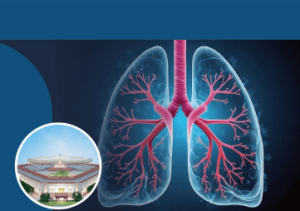New Delhi: In a compelling and forward-looking address, the Hon’ble Vice-President of India Shri Jagdeep Dhankhar inaugurated the 27th Annual Conference of the Indian Association for Bronchology — BRONCOCON 2025 — in New Delhi, emphasizing the urgent need for a nationwide, multi-sectoral approach to combat India’s growing respiratory health crisis. The event witnessed the convergence of over a hundred leading minds in pulmonology, technology, public health, and policy-making.
About BRONCOCON 2025
BRONCOCON is India’s leading annual medical conference focused on bronchology and pulmonary care, organized by the Indian Association for Bronchology. This 27th edition brought together top doctors, researchers, policy-makers, and technologists under one roof to discuss the latest advancements, challenges, and innovations in respiratory health.
“Each Breath You Protect Is a Nation You Secure”
Addressing an esteemed gathering of medical professionals, researchers, and policymakers, the Vice-President lauded the role of pulmonologists and bronchologists as the “silent sentinels of public health” — individuals who safeguard the very act that defines life: breathing. He called BRONCOCON 2025 a ‘crucible of ideas’, instrumental in shaping the future of pulmonary care not only in India but globally.
“Every breath you protect is a nation you secure,” he remarked, underlining the centrality of respiratory health to national progress and human dignity.
A Growing Health Emergency
 The Vice-President raised alarm over the worsening air quality and its cascading effects on public health. Citing data, he noted that respiratory diseases now comprise India’s largest disease category, affecting nearly one-sixth of the population. Children, the elderly, farmers, and industrial workers are particularly vulnerable to asthma, COPD, tuberculosis, and lung cancer — all aggravated by air pollution, biomass smoke, and chemical exposure.
The Vice-President raised alarm over the worsening air quality and its cascading effects on public health. Citing data, he noted that respiratory diseases now comprise India’s largest disease category, affecting nearly one-sixth of the population. Children, the elderly, farmers, and industrial workers are particularly vulnerable to asthma, COPD, tuberculosis, and lung cancer — all aggravated by air pollution, biomass smoke, and chemical exposure.
He voiced grave concern over the psychological toll and social stigma associated with diseases like TB and cancer, and demanded a stronger public health response that goes beyond clinical care to include emotional and community-based support.
The Need for Systemic Change and Stakeholder Convergence
The Vice-President criticized isolated, elitist solutions such as personal air purifiers, advocating instead for inclusive and systemic reforms. “Democracy must deliver equality. Solutions can’t be selective,” he said, calling for action that benefits all sections of society.
He highlighted that the future of respiratory care lies at the intersection of:
-
Modern medicine
-
Technology
-
Environmental science
-
Public policy
-
Community engagement
This integrated model, he said, must replace the fragmented approaches of the past. “We need a convergence of minds, missions, and mechanisms — all stakeholders must be on the same page,” he urged.
Health and Traditional Knowledge: Rediscovering India’s Ancient Wisdom
In a poignant segment of his speech, the Vice-President invoked India’s ancient texts, especially the Atharva Veda, which view ‘pran’ (breath) as the life force connecting human wellness to nature. He condemned modern society’s exploitation of the environment for greed, stating that humanity must return to seasonal living, dietary wisdom, and forest conservation — all deeply embedded in Indian culture.
Referring to Yoga and Pranayama, the Vice-President reiterated their scientific validity and therapeutic power, especially practices like Anulom Vilom, Kapalbhati, and Bhastrika. He called for their integration into mainstream medicine and appealed to the youth to learn them authentically for lifelong health.
“These are not temporary trends but recipes for longevity,” he said. “They enhance immunity, reduce stress, and improve productivity.”
Bridging the Urban-Rural Divide: A Call for Equitable Healthcare Access
The Vice-President stressed the importance of decentralizing respiratory care infrastructure. “Equipping metros is not enough,” he warned. “We must take life-saving interventions to the district-level health centres.” This, he stated, would be vital to achieving national goals like tuberculosis elimination and reducing lung cancer mortality.
He praised India’s growing accessibility to healthcare technology but noted that affordability and awareness remain pressing issues.
Environmental Action and Behavioural Change: Imperatives for Survival
Calling the current situation a “cliff-hanging moment,” he drew attention to India’s alarming Air Quality Index (AQI) and the public apathy surrounding it. Vehicular emissions, crop residue burning, and lifestyle diseases, he warned, are escalating at an unsustainable pace.
The Vice-President advocated for:
-
Accelerated phase-out of old vehicles
-
Strengthened public transport
-
Wider adoption of green energy
-
Promotion of behavioural change at individual and societal levels
Authentic Research as a Global Contribution
Cautioning the scientific community, he emphasized that research must not become self-serving. “Research is not for publication but for transformation,” he declared, urging scientists to produce outcomes that can benefit not only India but the global community.
He hailed India’s efforts in green energy and rural electrification, but said these must now be matched by equivalent innovation and commitment in the health sector.
Conclusion: A Future of Hope, Not Despair
Despite the grim realities, the Vice-President concluded his speech on a note of optimism. He expressed confidence in India’s ability to turn the tide through innovation, traditional knowledge, and stakeholder unity. He encouraged attendees at BRONCOCON 2025 to treat the conference not just as an academic exercise, but as a launchpad for real-world action.
“I am full of hope, optimism and confidence. When minds like yours converge — to ideate, to research, to care — the nation breathes easier,” he said.
For the official press release and full speech transcript, visit PIB India’s website.
For more Detailed info about the event, visit BRONCOCON 2025 website.
For more Real time updates, visit Channel 6 Network.

